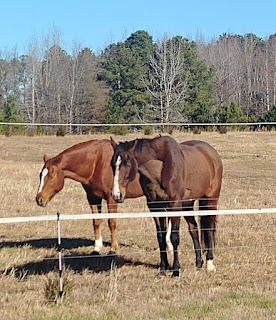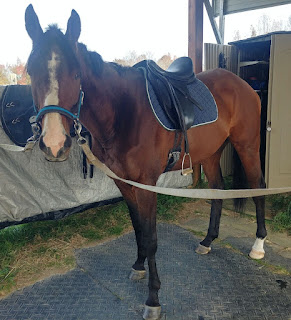Y'all. This lil' Mousey...this is a Real Good Horse.
But I'm getting ahead of myself.
I can't quite believe it's already been two months since Mouse moved into my life & set about gently re-expanding the boundaries of existence with a much-needed shot of hope. The first order of business was to just relax & get to know each other while Mouse's body took a break.
Despite a clean PPE, any horse in hard work, whether that is racing or jumping or prancing, is most likely carrying micro-injuries. This is why we all need days off & why over-training & over-competing lead to disaster - you have to give tissues time to rest & recover periodically in order to stay healthy. According to the vet, soft tissues need 6-8 weeks to heal micro-tears, while bone needs more like 8-10 weeks. Mouse last raced in mid-September, so I wanted to be sure I gave his body space to re-solidify his base before we started to rebuild.
 |
| Many napzzzz needed |
Because Echo had been such a big project in that respect, as you can read about in the link, I strapped on my metaphorical toolbelt & prepared to do it all again with Mouse. Beginning with the most basic exercise of just hanging out with him in the pasture, scratching itchy spots for no reason, making no demands, not trying to catch him, just being a pal.
Except Mouse already wanted to be my pal. He politely arranged his body next to me, requesting scratches in various places, rotating to gently place his butt in my face because that is the best scratching of all (according to Mouse). He already knew how to wear a blanket & hadn't a care in the world when I threw the noisy things over his back. He already had excellent manners while leading, already waited politely while being fed, already stood patiently while tied or in a trailer. He already was fine with Human Carrying Weird Objects & Tripping Over Things.
Well, ok then. That was easy.
In November, we started ponying out on the trails, my favourite low-impact way to show a horse the world, get their body moving a little, start conditioning, get them used to nature things, all while making Solo very happy to be out & in charge. Mouse was...completely mellow & perfect & unfazed by all of it, even crunchy leaves that made us sound like elephants & splashy water crossings.
 |
| First water crossing |
Well, ok then. That was easy. Which is becoming my theme for this horse & about which I am NOT complaining.
In late November, I got all toolbelt-ed up again & decided to teach him to stand at the mounting block while I got on & off. Except he already knew how to do that & stood like a rock while I got on, messed with stirrups, leaned around, made Weird Human Noises. Someone started this horse very thoroughly & very well & whoever you are -- THANK YOU!!!! Oh dear cod, thank you so very, very much. For anyone who is breeding & starting young horses, this is how you help ensure your horses find & keep good homes, because while I CAN teach all these skills, many people can't or don't want to, & a horse who is polite & easy to handle is a horse who is safe to do things with. That just makes horse & human lives so much easier. But I digress... (But it was still easy!)
 |
| The cutest straight-A student |
I've successfully introduced him to some basic longeing skills & he is very smart, having figured out the voice commands quickly, but he is struggling a bit with the whole "circle on his own" concept. So recently, I introduced him to long-lining (which of course, he accepted completely uneventfully) so that I can actually control both sides of his body. While our "circle" still resembles more of a drunken stagger (hey, we've only done it twice), I am able to communicate with him more clearly, so I will stick with the long-lines for a while. He's just starting to figure out that he can stretch forward & down & it's exciting to see those discoveries, which will be the bridges to reshaping his body.
And perhaps most fun of all, if you missed it on our Insta-feed, I got to ride Mouse out on his first trail ride already! A friend piloted Solo for me, so I could let the Mouser try out nature under saddle. And it was the best kind of boring I could have asked for: he ambled along in the sun on a loose rein, as relaxed as if he'd done it a thousand times. Most of the time he led & in a couple of spots where he hesitated & glanced back, we let Solo pass by & Mouse happily fell in line. I think I had that big dumb grin on my face a lot of the time.
 |
| Yes, his front feet are kind of in the ditch |
I've pulled his shoes to let his feet strengthen & spread & he's had his first chiro adjustment to get out the starting gate kinks. The focus will be just finding some consistent rhythms, learning some big, loopy figures, doing hill work & ground poles & trails to slowly build strength, building cues to control different body parts, & just having fun.
But damn, it's tempting, sitting on this smart, balanced, quiet, capable, pleasant, willing horse who is always tuned in to me & who makes the most adorably earnest efforts to do anything I ask. It would be so easy to throw him at some jumps, to push him into a frame, to jump ahead to the "fun stuff." But I think I just may have found a little gem & with patience, I think he is going to be a really, really amazing partner. To get there, however, & to keep him happy & sound in the long term, it requires the patience & time to be slow & methodical at the beginning. Here is where we make the investments so that hopefully, if we can just catch some luck along the way, we get to enjoy the big payoffs in days to come.
 |
| Just close your eyes & take a deep, patient breath |















 There are many tempting factors about bringing along a young horse: training the way you want, the theory of having more years to play with it (at which horses laugh, but I digress already), building a partnership while horse brain is in a more malleable stage.
There are many tempting factors about bringing along a young horse: training the way you want, the theory of having more years to play with it (at which horses laugh, but I digress already), building a partnership while horse brain is in a more malleable stage.










 Because you can't have one without the other, at least when it comes to horses.
Because you can't have one without the other, at least when it comes to horses.


 I am trying to adopt these two simple words as my Equine Mantra.
I am trying to adopt these two simple words as my Equine Mantra. 




 Hmmm, that title could be true for so many scenarios, however, in this case, I am referring to a certain Baby Monster. Who is basically a mouth with legs.
Hmmm, that title could be true for so many scenarios, however, in this case, I am referring to a certain Baby Monster. Who is basically a mouth with legs.


 Echo the Baby Monster has been busy -- sometimes even with things I actually want him to do. More often, eating, more eating, finding ways to annoy both Solo & I, then eating some more.
Echo the Baby Monster has been busy -- sometimes even with things I actually want him to do. More often, eating, more eating, finding ways to annoy both Solo & I, then eating some more. 










